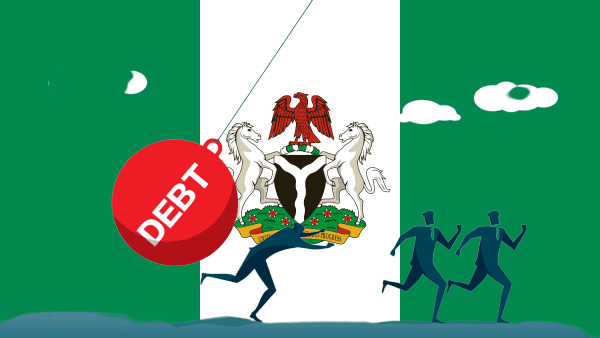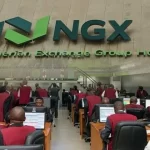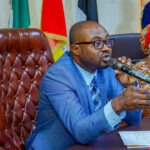Debt servicing has become a major financial burden for Nigeria, taking precedence over other critical sectors like education, health, and infrastructure. The proposed 2025 budget, tagged the “Budget of Restoration: Securing Peace, Rebuilding Prosperity,” allocates N15.81 trillion to debt servicing. This allocation is more than the combined budget for essential services. For ordinary Nigerians, this raises questions: What is debt servicing, and why does it dominate our national budget?
Debt Servicing Explained
Join our WhatsApp ChannelDebt servicing refers to the repayment of loans, including interest and principal, borrowed by the government. In simple terms, it is the cost of borrowing to finance projects or make up for budget deficits. For Nigeria, with its ballooning national debt, the cost of servicing these loans has become a pressing concern.
How Debt Servicing Impacts Nigeria
Nigeria’s debt has reached a staggering N134.3 trillion, a historic high. This growing debt leaves little room for development spending. Economists warn that such high debt servicing could harm sectors crucial for economic growth and citizens’ welfare.
“Debt servicing is choking Nigeria’s economy,” said Professor Damilola Adedeji, a financial expert. “When over half of the national revenue is allocated to repay debts, it leaves the government with fewer resources to tackle pressing issues like unemployment, education, and health care.”
2025 Budget: Priorities Misaligned?
President Bola Tinubu’s administration is under scrutiny for its financial policies. Despite tagging the 2025 budget as a step toward prosperity, critics argue that the focus on debt servicing reflects misplaced priorities.
Dr. Aisha Bello, a public policy analyst, pointed out, “Allocating N15.81 trillion to debt servicing while millions go hungry shows a disconnect between the government and the people. This isn’t just an economic issue—it’s a social one. People are starving, and yet, debt repayment takes precedence over their survival.”
In Tinubu’s inaugural 2024 budget, titled “Budget of Renewed Hope,” the economic optimism promised did not materialise. With inflation at 34.6% and the naira trading at N1,700 to the dollar, the financial struggles of ordinary Nigerians have deepened.
Experts Question Assumptions in the Budget
The proposed budget for 2025 relies on optimistic projections for oil revenues, exchange rates, and foreign investments. However, these assumptions may be unrealistic, given the volatile global oil market and Nigeria’s current economic instability.
Speaking on the matter, Dr. John Eze, an economist with the Nigerian Institute Of Social And Economic Research, expressed skepticism. “The government is banking on assumptions that may not hold water. If oil prices fall or production dips, the projected revenues will collapse, leaving the country in a deeper financial hole. Debt servicing will continue to eat away at our resources.”
READ ALSO: Atiku Highlights Why Nigeria’s 2025 Budget Is Unsustainable
The Bigger Picture: Citizens Left Behind
For a country with over 64% of its population going hungry, the implications of prioritising debt servicing are dire. Tinubu’s administration has been criticised for failing to address issues that directly impact citizens’ daily lives. Hunger, insecurity, and unemployment dominate the social landscape, yet the government appears more focused on managing international loans than alleviating local suffering.
“Nigeria’s budget has turned into an exercise in futility,” said Professor Adedeji. “Year after year, we see funds misallocated, corruption flourishing, and ordinary people paying the price. Unless we shift priorities, the gap between the government and the governed will only widen.”
What Needs to Change?
Experts agree that a significant shift in fiscal priorities is necessary. Reducing the reliance on borrowing and increasing revenue through diversification of the economy could alleviate the debt burden.
Dr. Bello suggested, “The government should focus on improving tax collection, curbing corruption, and investing in sectors like agriculture and technology. These are areas that can generate sustainable revenue and reduce our dependence on loans.”
Additionally, more transparency in how borrowed funds are used could help restore public trust. Currently, many Nigerians remain skeptical of whether the funds borrowed benefit the public or merely enrich a select few.
A Nation at a Crossroads
Debt servicing in Nigeria’s 2025 budget highlights the delicate balance between fulfilling international financial obligations and addressing domestic needs. With N15.81 trillion set aside for debt repayment, the government faces criticism for prioritising creditors over citizens.
As Dr. Eze noted, “The future of Nigeria depends on how we manage our resources today. If the government continues down this path, we risk deepening economic inequality and losing public trust. A nation can only thrive when its leaders put the people first.”
For now, ordinary Nigerians are left with cautious hope tempered by skepticism. Whether the administration’s promises will translate into tangible benefits remains to be seen. For a country in desperate need of visionary leadership, the stakes have never been higher.
Emmanuel Ochayi is a journalist. He is a graduate of the University of Lagos, School of first choice and the nations pride. Emmanuel is keen on exploring writing angles in different areas, including Business, climate change, politics, Education, and others.
- Emmanuel Ochayihttps://www.primebusiness.africa/author/ochayi/
- Emmanuel Ochayihttps://www.primebusiness.africa/author/ochayi/
- Emmanuel Ochayihttps://www.primebusiness.africa/author/ochayi/
- Emmanuel Ochayihttps://www.primebusiness.africa/author/ochayi/


















Follow Us